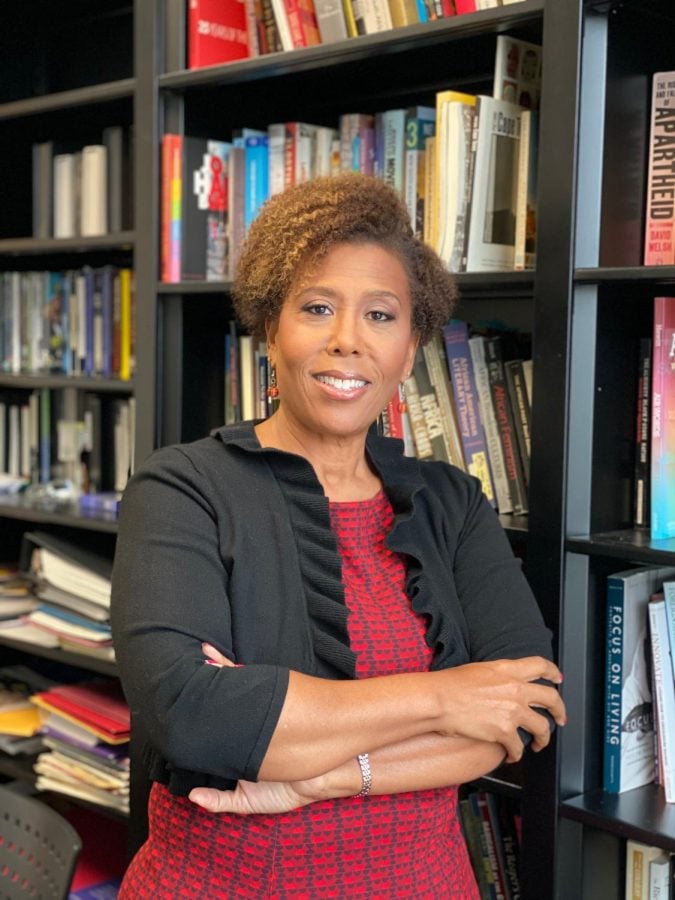Medill Prof. Ava Greenwell publishes book “Ladies Leading: The Black Women Who Control Television News”
Photo courtesy of Ava Greenwell
Medill Prof. Ava Greenwell released “Ladies Leading: The Black Women Who Control Television News” in March 2021.
April 13, 2021
One woman recounted her employee telling her women didn’t belong in the news business. Another woman had to field complaints from a subordinate who didn’t want to take orders from a “Black girl.” In her latest book, Medill Prof. Ava Thompson Greenwell is sharing the previously untold stories of Black women in the broadcast journalism industry.
Greenwell’s book “Ladies Leading: The Black Women Who Control Television News” exposes the implicit racism and sexism in America’s television networks through interviews with 40 women in the industry.
After working on her dissertation in 2011, Greenwell became interested in learning about women she hadn’t seen in television newsrooms and the role they might play behind the camera. She said she knew there were so few women of color in managerial positions, so she wanted to use her journalism skills to turn it into research.
“I used this as an opportunity to ask the questions I always wanted the answers to,” Greenwell said. “The stories had not been told before, and I felt as though the industry as well as students, particularly journalism students, needed to hear these women’s stories.”
Greenwell initially reached out to 100 women, not expecting many replies back. In the end, 40 women spoke with her, ready to share their stories. Greenwell said she chose to keep them anonymous out of respect for their privacy and their careers.
She named the women after flowers, which represent the women’s growth despite the lack of nurturing conditions, and gemstones, which represent endurance.
“We (should) not be so focused on who’s saying it, but what they’re saying and the patterns they talk about,” Greenwell said.
Some of those patterns are terms Greenwell has coined herself such as “FOMM,” or the fear of making a mistake, and “Intellectual Theft Syndrome,” in which these women’s ideas were stolen, often by White men.
In the book, Greenwell emphasizes the extra intellectual and emotional work these women endure, with no additional compensation — leading to premature retirements or breaks from the field. The industry suffers a major loss when this occurs, Greenwell said, because having Black voices in managerial positions allows for more nuanced stories and a disruption of stereotype coverage.
While the process of writing the book was difficult, it also provided an outlet for not only the women interviewed, but Greenwell and her colleagues as well.
“For the women, it was cathartic, and for me, it was cathartic,” Greenwell said. “There were some things that came up for me that I hadn’t thought about for 30 years, microaggressions I pushed down and didn’t think about.”
In a podcast accompanying the book, Medill junior Camille Williams and her peers break down the stories of Black women in broadcast journalism by chapter. Williams helped produce the “Ladies Leading” podcast, the first episode of which was released last week.
Williams, who works with Greenwell as an undergraduate research assistant, called the experience “eye-opening.” She said many of the discussions on the podcast were upsetting because she did not realize how often microaggressions occurred in the workplace. But she added that it was empowering and a wake-up call for what her experience could be like when she joins the workforce.
“At times, (the discussion) felt like it was bursting my bubble, but at the same time, the bubble had already burst,” Williams said. “It really laid bare how frequent microaggressions are because so little about how we look at Black people has changed.”
Julia A. Royston, Greenwell’s publisher, said the book will impact the next generation. Royston said one of her goals and responsibilities as a publisher is to publish stories that highlight diversity and empower women of color. “Ladies Leading,” Royston said, does just that.
“I want it to be a training tool, a history book of people who have blazed the trail, gone before you and what they’ve had to experience,” Royston said. “Sometimes you need to be thankful and appreciative of these people who are still standing with integrity.”
In addition to inspiring young Black women, Royston said she hopes the book will also shed light on the Black women behind the scenes. Much of Black history has been lost or erased, and this book is an opportunity to tell Black stories and leave a legacy for the new generation, she said.
Greenwell said her goal was to affirm the experiences women of color face, but also to send a message to all journalists entering the field today.
“If we ever want a better world and better newsroom, we need to make sure student journalists understand the history that has preceded their work and then hopefully they can make it better,” Greenwell said.
Email: rebeccaaizin2023@u.northwestern.edu
Twitter: @rebecca_aizin
Related Stories:
— NU faculty discuss racism, lack of support in “unprecedented conversation”
— Bria Walker discusses work, legacy of playwright Ntozake Shange
— NU alumna and comedic writer Jen Spyra talks comedy writing career, debut book



